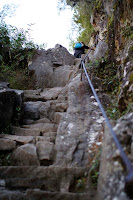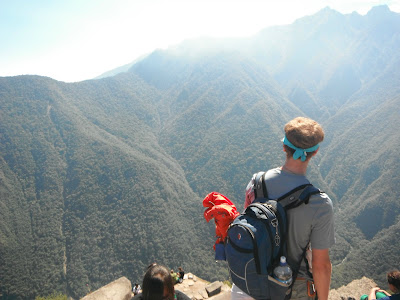My ticket for Machu Picchu included a ticket to climb a lesser known, ableit in-plain-sight, land mark: Huaynapicchu. It's the mountain looming behind Machu Picchu in every postcard of the place that you've ever seen (I have a picture like I'm talking about on my post "
See"). I was going to climb it to the peak, a la cima.
 |
| The path. |
The steps—the climb—up to the top was made by the Incas. The steps are steep, but when they get really steep there's a rope (which was not made by the Incas). However, about two-thirds of the way up the trail takes a break from steps. Now the trail was just a steep, narrow trail of mountain. Here and there you'd get that rope, but more often than not you just relied on your balance and footing as you climbed ragged rocks up and up and up. You look over the edge, which is inches from you, and see just how high you are and just how easy it would be to make a mistake and fall off the mountain.
At this point it struck me: if something were to happen, there's no one to fall back on. There aren't park rangers or security guards on the mountain. If you were step wrong and shatter your ankle, there's no way you're getting down the mountain without using that same ankle. If you have a heart attack, there's no one to call for a helicopter—and if there were it would be impossible for the helicopter to pick you up from the mountain side. If you trip and fall, you could actually plummet from the side of the mountain.
 |
| Huaynapicchu. |
We were all tourists climbing this mountain, but we were each entirely alone, entirely responsible for ourselves, entirely independent. It was not entirely familiar for me. My dependence was wrenched from me because Huaynapicchu rendered it impossible to hold onto. It was empowering. More so than at any other time in my life, I felt a powerful sense of being alone; alone in the sense of being a lone one: a lone person, independent of all others. Not a sense of irresponsibility of my effect on others, but a sense of total responsibility for my effect on myself.
At the top of
Huaynapicchu I looked around and saw everyone else who had hiked to the peak as well, all on our own, each one of us. I've never felt or been quite as accountable for my actions as at that moment. Going back down the mountain the feeling stayed with me. The deep, clear breathes of independence at the peak of Huaynapicchu were very unfamiliar but very welcome.
Monday, July 16, 2012
| Filed Under
people,
peru,
thoughts,
tourist,
trek
|











